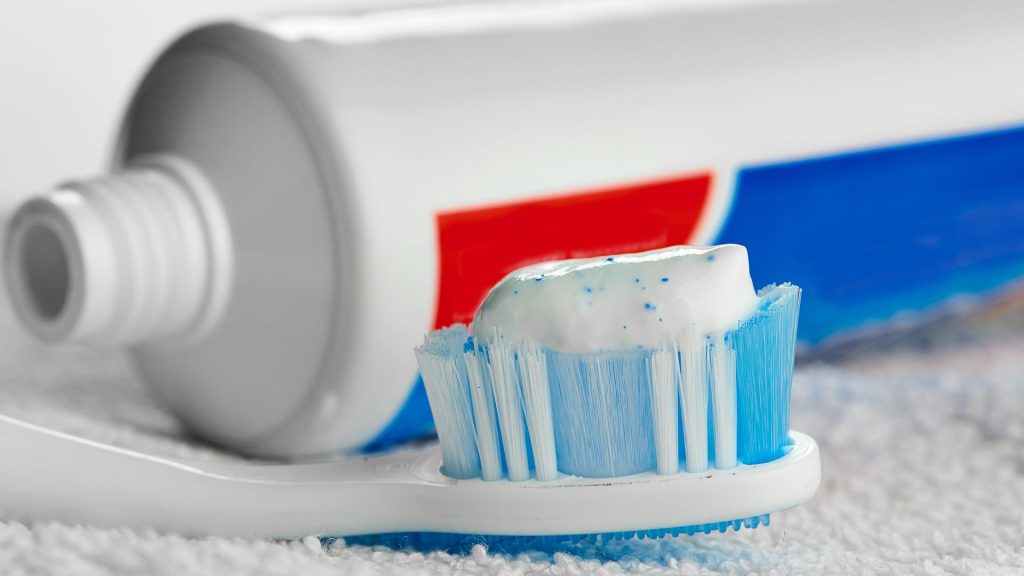Does whitening toothpaste work? The answer is yes. However, regular brushing and flossing are required while using this toothpaste. Everyone wants pearly whites that shine when they smile. This explains the widespread use of whitening toothpaste. However, many people still doubt the effectiveness of teeth-whitening toothpaste.
Does this stuff really whiten teeth? Spring Orchid Clinic’s dentist will repond to your inquiry here.
About Whitening Toothpaste


Plaque-removing and tooth-whitening ingredients are carefully balanced in whitening toothpaste. Whitening toothpaste comprises antibacterial agents, fluoride, bleaching enzymes, hydrogen peroxide, and calcium carbonate.
Furthermore, bleaching toothpaste may get rid of plaque and brighten your smile. Whitening toothpaste works by permeating the tooth enamel to remove plaque and discoloration.
However, dental supervision is required for whitening toothpaste. It may destroy the enamel, create gingivitis, and cause tooth sensitivity.
Whitening Toothpaste Mechanism
Hiroyuki Okamoto et al.’s 2014 Journal of Dentistry research found that whitening toothpaste works mostly via oxidizing chemicals. teeth. These chemicals break down tooth surface color molecules, reducing adherence and boosting light reflection and tooth whitening. Whitening toothpaste also removes plaque and bacteria from teeth.
Also, the Journal of Clinical Dentistry reported in 2011 that toothpaste’s sodium tripolyphosphate and calcium may help remove yellow stains.
However, using whitening toothpaste does not guarantee the safety or lack of negative effects. Overuse damages tooth enamel and causes tooth sensitivity. Thus, dental specialists should supervise whitening toothpaste usage.
Does Whitening Toothpaste Work?


Studies consistently find that whitening toothpastes produce whiter teeth. However, the effectiveness of toothpaste depends on factors such as its ingredients, how long and how often one uses it, and the user’s dental health.
In 2018, the Journal of Esthetic and Restorative Dentistry found that peroxide-containing teeth whitening treatments whiten teeth better than those without peroxide. Research also showed that using a whitening solution for 10-14 days yields the best results.
But, it’s important to remember that overusing or abusing whitening toothpaste may lead to sensitive teeth and enamel wear. The Journal of Clinical Dentistry reported in 2011 that long-term usage of whitening toothpastes might weaken tooth enamel and increase damage risk.
Thus, to get the greatest results from whitening toothpaste, follow the recommendations and see a dentist.
Types Of Whitening Toothpaste
Technology and science have created various whitening toothpaste with varied chemicals and applications. With so much information and alternatives, picking the proper product may be difficult.
So, we’ll list the most popular whitening toothpaste below so you can examine their pros and cons and choose wisely:
Natural Whitening Toothpaste
Many people worry about the chemicals in traditional teeth whitening solutions, yet whitening toothpaste is growing increasingly popular. Thus, gentler, natural tooth whitening treatments are increasingly needed.
Today, Spring Orchid Clinic’s dentist will offer 3 popular natural whitening toothpaste to assist you in picking the best and safest product for your teeth:
- Whitening Toothpaste with Activated Charcoal: This toothpaste removes plaque and yellow stains from teeth naturally using activated charcoal. Activated charcoal reduces gingivitis, fights disease-causing germs, and absorbs toxins and grime.
- Whitening toothpaste with baking soda: Baking soda is a common ingredient in natural teeth whitening products. Toothpaste with baking soda whitens teeth, removes yellow stains, and reduces plaque. Baking soda helps regulate oral pH and prevent harmful microorganisms by being slightly alkaline.
- Whitening Toothpaste with Tea Tree Oil: Antibacterial tea tree oil fights foul breath and plaque. Tea tree oil toothpaste cleans and whitens teeth naturally. To minimize damage to teeth and gums, tea tree oil toothpaste should be used under dental supervision.
Chemical Whitening Toothpaste
Many individuals want a white smile, and teeth-whitening toothpaste is a popular technique to get it. They worry about the chemicals that might harm their teeth and gums.
In this section, we’ll describe the three most popular chemical-containing whitening toothpaste so you can choose the ideal one for your needs.
- Peroxide-whitening toothpaste: Many teeth-whitening products include peroxide. Peroxide whitens teeth by eliminating yellow stains and discoloration from the enamel. However, peroxide may destroy tooth enamel and make teeth more sensitive.
- Carbamide peroxide-whitening toothpaste: Teeth-whitening preparations also include carbamide peroxide. Hydrogen peroxide whitens teeth when carbamide peroxide dissolves in water. Carbamide peroxide is stronger and may destroy tooth enamel and gums.
- Whitening toothpaste with fluoride: Oral care products include fluoride to strengthen tooth enamel and prevent cavities. Fluoride reduces enamel sensitivity and removes yellow stains to whiten teeth. To minimize tooth and gum damage, fluoride tooth whitening should be done by a dentist.
Notes On Whitening Toothpaste


There are a few things to remember when using whitening toothpaste to make sure it does its job and doesn’t do any damage:
- Too much whitening toothpaste may harm teeth and gums.
- Avoid using toothpaste with strong chemicals too regularly since they might destroy enamel and make teeth sensitive.
- To remove plaque and stains from teeth, whitening toothpaste should be used after proper oral hygiene.
- To minimize gum irritation and inflammation, avoid contact with peroxide-containing toothpaste.
- To maximize the effects of whitening toothpaste, brush your teeth properly and for a long enough time.
Lastly, visit your dentist often and ask your doctor about dental care and whitening toothpaste.
Alternative to Whitening Toothpaste
When it comes to teeth whitening, most people immediately think of using whitening toothpaste. Even said, there are a variety of additional treatments that may help whiten teeth efficiently, so it’s not necessary to limit yourself to only toothpaste. These treatments will be covered next:
- Laser teeth whitening: Laser light activates tooth-whitening chemicals. This approach is quicker and more effective than whitening toothpaste, but it costs more and requires a dentist.
- Microwave teeth whitening: This microwave-activated teeth whitening technology is the latest. This procedure outperforms whitening toothpaste but is expensive and complicated.
- Use whitening strips: Whitening strips include a bleaching ingredient and are put on the teeth for a set duration. Laser and microwave bleaching are more effective, but this procedure is easier and more convenient.
- Teeth whitening with tea tree oil: Tea tree oil contains antimicrobial and tooth-whitening effects. Use a tiny quantity of tea tree oil to brush your teeth every day or mix it with toothpaste to whiten them.
However, teeth whitening should not be overdone to prevent dental health issues. It is advisable to consult your dentist before using any whitening treatment.
Conclude
Everyone desires a dazzling smile with white teeth. However, whitening toothpaste and natural therapies may not work for everyone. If you want a flawless smile, Spring Orchid Clinic in Bassendean offers teeth whitening and cosmetic dentistry.
- To give you a bright, confident, and appealing smile, we apply the latest teeth whitening procedures. We provide the finest and safest care with a team of experienced and educated physicians.
- Also, at Spring Orchid Clinic, we provide a comprehensive variety of aesthetic dentistry procedures, including orthodontics, dental restorations, bleaching, implants, and more, to help you achieve flawless and balanced teeth.
- Moreover, Spring Orchid Clinic offers high-quality service in a pleasant, professional setting with the latest equipment, procedures, and technology.
Visit us for a flawless smile!
FAQs
Can Children Use Teeth Whitening Toothpaste?
No, they shouldn’t. The American Dental Association recommends teeth whitening solutions for 18-year-olds and older. Thus, under-18s should not use tooth whitening solutions.
Children’s teeth have weaker enamel layers and are still growing. Whitening toothpaste damages tooth enamel. Teeth whitening solutions include toxic substances that youngsters may swallow.
Instead, youngsters should use ordinary fluoride toothpaste to avoid tooth decay. So, ask a dentist about the best way to whiten your child’s teeth.
Can Pregnant Women Whiten Their Teeth Using Toothpaste?
According to the American Dental Association, pregnant women should minimize tooth whitening products.
Because teeth whitening treatments include peroxide, carbamide peroxide, or hydrogen peroxide, they might irritate the gums and soft tissues. Ingesting significant quantities of tooth-whitening chemicals might also damage the mother and baby.
Does Teeth Whitening Toothpaste Cause Allergies?
Yes, they can. Teeth whitening toothpastes can cause allergies in some people. Allergy symptoms may include: pain, swelling or bleeding gums, itchy or skin rash, difficulty breathing or coughing.





